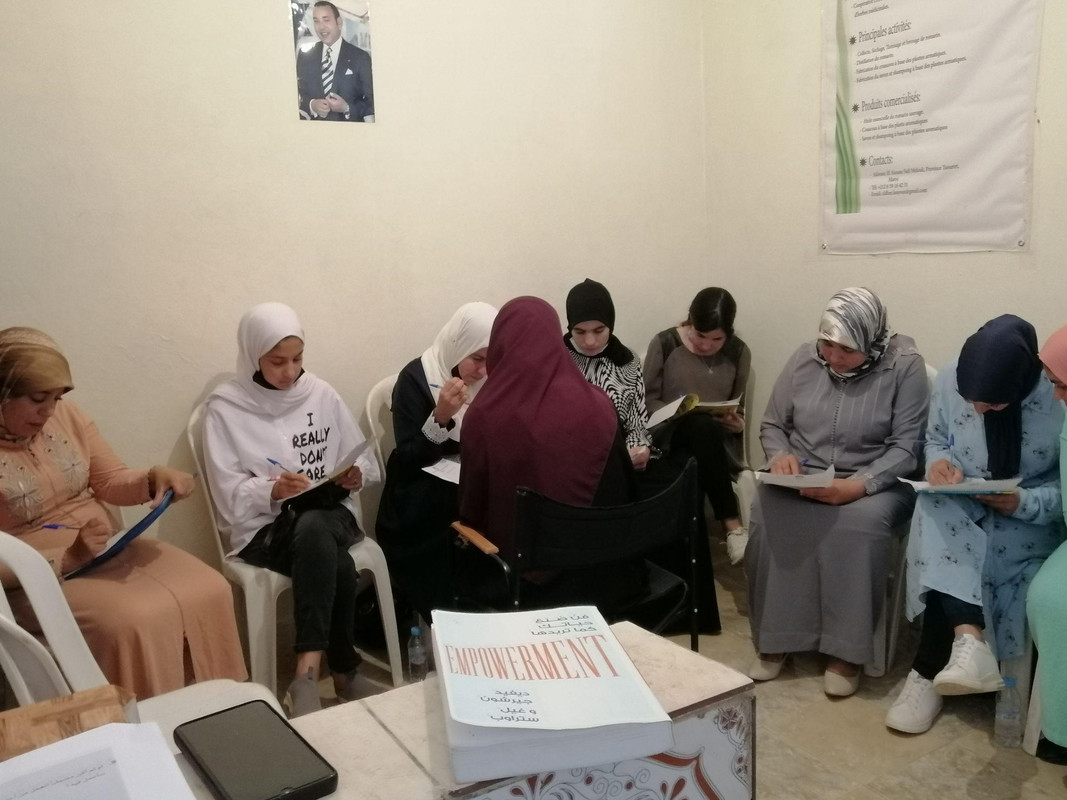Zineb Laadam
HAF Field Officer

Team members of the High Atlas Foundation managing the USAID Farmer-to-Farmer (F2F) Program met two host organizations (HOs) in Laayoune Charkia municipality in the Oriental region and discussed with them how to collect data and fill out the baseline and Organizational Development Index (ODI) forms.
The women’s cooperatives are “Laayoun Li Tanmyat El Aachab Tebiya” and “Arnan.” Both of the HOs are extracting rosemary oil and have similar needs.
The F2F Program conducted a women’s empowerment training workshop for these cooperative members and will follow up with an assignment in order to deliver training on rosemary cosmetics manufacturing and its oil extraction techniques.
The meeting with cooperative members resulted in a clear vision of their priorities:
Laayoun Li Tanmiyat El Aachab Tebiya:
The cooperative was created in April 2019, in Sidi Malouk, Laayoune municipality, Taourirt province in the Oujda region. The cooperative has already benefited from the MEPI program with the High Atlas Foundation (HAF) in 2019, and training workshops on E-marketing from the F2F program in March 2021. They asked for more training sessions on rosemary oil extraction so that they can reach regional and international prospective customers.
Arnan Cooperative:
Arnan cooperative is an agricultural cooperative founded in 2017 by 5 members (all women) and it is based in Laayoune Charkia municipality in the Oriental region.They are producing cosmetic products using natural rosemary. The cooperative’s vision for the future is not limited to marketing their products. They want to improve the quality and quantity of their rosemary cosmetics—such as shampoo, soap, and skin ointments—on site instead of selling their raw materials to cosmetics laboratories in big cities. To do this, they need to be prepared to meet health and safety criteria, and the women who work at the cooperative will need training courses in the preparation of cosmetics—how to manufacture them properly and how to work with specialized equipment.
The HAF team, through the F2F Program, completed the IMAGINE workshop for female members of four agricultural cooperatives from October 29 through November 1 in Berkane province (Oriental region). Ideally, empowerment through this workshop is a continuous, holistic process with cognitive, psychological, social, and economic dimensions. These activities are designed to achieve local development by building women’s capacities to improve the economic future and the quality of life for inhabitants of the province.
This training course was shaped around a vision of bringing a wide variety of women together to learn from each other and to look critically at their work in the cooperative for building a stronger movement. The participants included youth and adult women with a wide range of educational backgrounds. As the course progressed, it became clear that exploring differences was one focus. We sought throughout the workshop to create an environment of support and challenge for all participants.
The women developed a set of strategies on research/documentation, networking, influencing, training, and media in their cooperatives. However, many of the women who participated also spoke about how important the challenge of acquiring life skills and searching for meaning in their lives is to them; they want something in their minds “besides the everyday.” Where a workshop creates space for the discussion of issues and for questioning the meaning of “a happy life,” this can lead to exploring the problematic connection between life issues and “getting ahead.” In this way, the nature of challenges in life can be broadened and the possibilities of social change strengthened.
